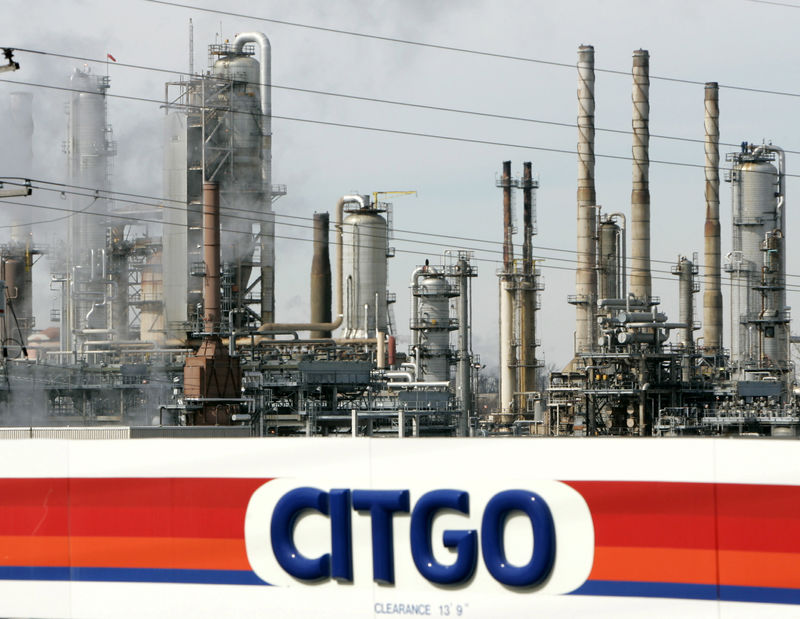By Alexandra Ulmer
WASHINGTON (Reuters) - A group of U.S. investors is seeking Washington's approval to acquire the nearly 50 percent collateral in U.S. refiner Citgo held by Russia's largest state-owned energy firm Rosneft, one of the investors said.
The move would prevent Moscow from seizing a large part of the U.S. refiner in the event of a full-blown default by its current owner, Venezuelan state oil company PDVSA. Texas-based Citgo operates a 749,000 barrel per day refining network in the United States.
With Venezuela’s economy devastated by five years of recession, President Nicolas Maduro's socialist government has increasingly turned to ally Russia for the cash and credit it needs to survive – offering prized state-owned oil assets in return.
Rosneft has snapped up some coveted oil fields in the OPEC nation, giving it growing control over Venezuelan crude exports and a stronger foothold in energy markets across the Americas.
Venezuela handed Rosneft ROSN.MM the 49.9 percent collateral in Citgo PDVSAC.UL in return for a $1.5 billion loan two years ago. The remaining 50.1 percent of shares in Citgo is collateral to holders of PDVSA's 2020 bond.
A steady decline in oil output, Venezuela's main source of hard currency, has contributed to making the country chronically late on its bond payments in recent months.
The Russian state oil company has been under U.S. sanctions put in place in 2014 to punish Moscow for aggression in Ukraine. Some U.S. senators have warned those sanctions could be violated should Russia take a stake in Citgo.
Amid the outcry, Rosneft and PDVSA PDVSA.UL were negotiating swapping the collateral to avoid complications stemming from the sanctions. The talks do not appear to have prospered.
Some Caracas-based oil sources said cash-strapped PDVSA was unable to offer anything attractive enough to Rosneft in return.
In the meantime, the group of U.S. investors has applied for a license from the U.S. Treasury's Office of Foreign Assets Control (OFAC) to assume the lien, according to the U.S. investor and documents seen by Reuters.
The investor asked to remain anonymous to avoid compromising a potential deal.
The request to OFAC, submitted in early October, has received basic technical approval but the group has yet to receive an answer from the Trump administration.
"The administration should recognize that if it doesn't do something pro-active here, it will face...limited options under almost any scenario, whether it is an attempt to foreclose by the current lienholder, further restrictions on Venezuelan crude oil imports into the U.S., or even in the event there is a positive political change in Caracas," the investor said.
Under the plan, no new debt would be issued. The investors would repay the outstanding loan balance and require that Rosneft terminate its lien and assign the loan to the new investors.
"This is a private sector solution to a public policy problem," the investor added.
In response to a query from Reuters, a Treasury spokesman said "Treasury does not discuss OFAC licensing requests, including to confirm whether or not one has been received, and does not comment on national security reviews."
POTENTIAL PROFITS
The U.S. investors see Citgo as an attractive asset that could easily become highly profitable. Trying to seize Citgo is "certainly not the plan," the investor stressed.
It is unclear whether Rosneft, whose powerful boss Igor Sechin is a close ally of Russian President Vladimir Putin, would be open to such an offer. The company declined to comment.
Caracas-based PDVSA did not respond to a request for comment.
The Citgo deal has particularly worried Washington, with senators Robert Menendez and Marco Rubio writing U.S. Treasury Secretary Steven Mnuchin to express their concern in September.
"Just as a matter of common sense, it would be better if those assets were held by American investors than by Rosneft," said Richard Morningstar, chairman of the Global Energy Center at the Atlantic Council and a former energy official under ex-president Barack Obama.
Despite long delays in Venezuela's debt payments, the holders of the bonds - some of the world's highest yielding debt - have been reluctant to press their claims in court, wary of a prolonged and messy litigation. That could yet change, sparking a potential stampede to seize assets.

Foreign companies seeking compensation for nationalizations under Venezuela's late leader Hugo Chavez have also objected to PDVSA using Citgo as collateral, alleging that Venezuela was seeking to reduce its exposure to assets in the United States, where they could potentially be seized.